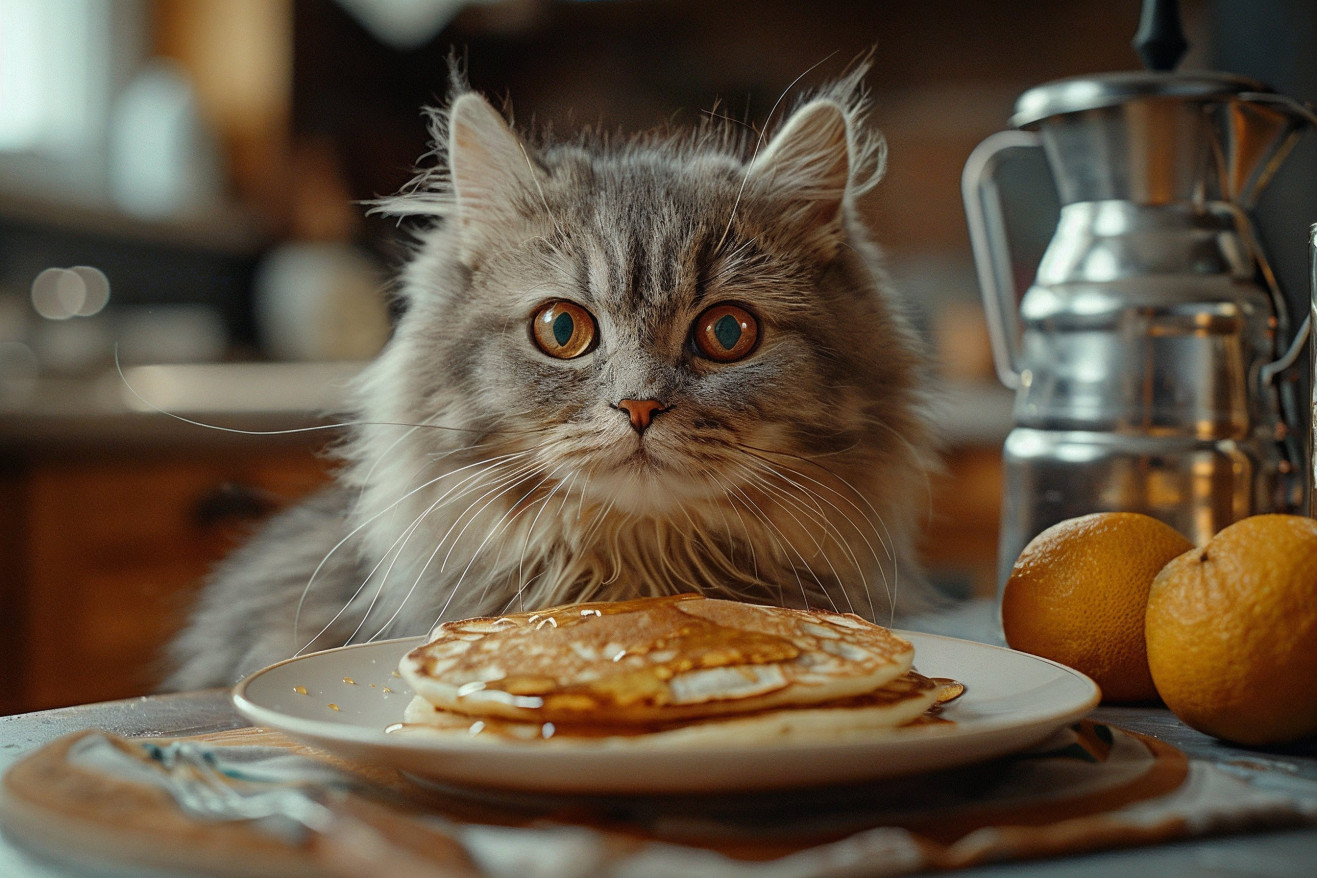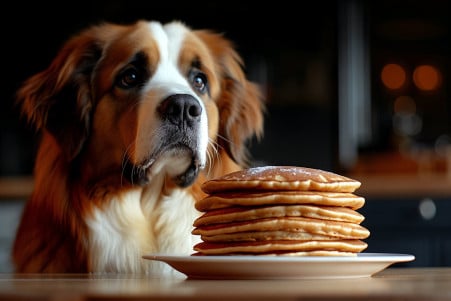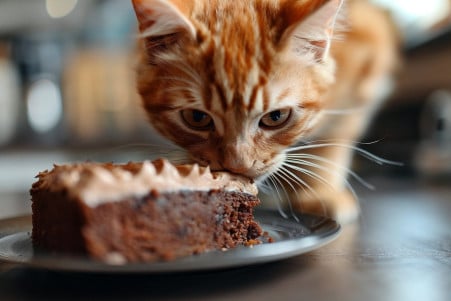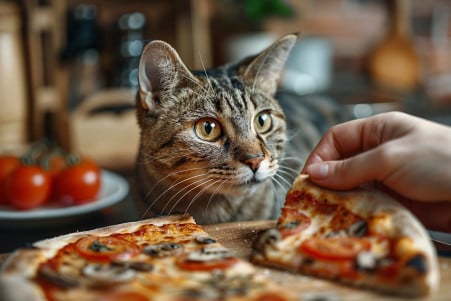Can Cats Eat Pancakes? Why This Human Food is Unsafe for Felines
4 April 2024 • Updated 2 April 2024

Pancakes smell sweet and delicious, and it's no wonder that cats are drawn to them. But can cats eat pancakes? The answer is no, cats cannot eat pancakes. There are several ingredients in pancakes that are bad for cats, and some are even toxic. These ingredients include refined flour, sugar, butter, and dairy products. Cats need a diet that is made up of animal-based proteins, fats, and other nutrients that are specifically designed to meet the needs of an obligate carnivore.
To understand why pancakes are bad for cats, let's take a look at what veterinary nutritionists, toxicology research, and studies on feline nutrition have to say. This multi-disciplinary approach will help us understand the physiological reasons that pancakes are not good for cats, as well as the potential dangers and health consequences of feeding our pets human food.
Can cats eat pancakes?
Ingredients in Pancakes That Are Bad for Cats
While pancakes may sound like a delicious idea for your cat, many of the ingredients in pancakes are not only bad for cats but can be toxic to them as well. Catster explains that flour and other refined carbohydrates in pancake batter are hard for cats to digest because of their obligate carnivore digestive system. Dairy products, such as milk and butter, are also commonly used in pancakes and can lead to digestive upset in lactose-intolerant cats because they don’t have the enzyme needed to break down lactose.
Pancakes are also high in sugar, which is a problem because sugar can lead to obesity, diabetes, and dental problems in cats. While eggs can be a good source of protein, raw egg whites contain the protein avidin, which blocks a cat's ability to absorb important B vitamins. In addition, many pancake mixes contain additives, flavorings, and preservatives that can be toxic to cats if ingested.
In the end, while a small amount of pancakes may not cause immediate harm, the ingredients in pancakes are not nutritionally sound or easy for cats to digest. Feeding cats food that their bodies aren't designed to process can have long-term health effects.
Dangers of Letting Cats Eat Pancake Batter or Raw Dough
There are a number of dangers associated with letting cats eat raw pancake batter or raw dough. Feline and Fiction notes that raw pancake batter can cause vomiting, diarrhea, and even pancreatitis in cats. In addition, the raw flour and raw eggs in the batter can be contaminated with bacteria.
The high sugar and fat content of pancake batter can also cause stomach upset in cats. JustAnswer also notes that eating pancake batter can cause pancreatitis, which can be fatal in cats. The smell and texture of the batter can be appealing to cats, which can lead to accidental ingestion.
Many pancake mixes also contain other ingredients like baking soda that can be toxic to cats if ingested raw. Another JustAnswer post explains that even small amounts of dry pancake mix can cause stomach upset in cats. It's important to make sure all pancake-related products are stored where cats can't get to them.
How to Make Cat-Safe Pancakes at Home
While traditional pancakes are not safe for cats, pet parents can make homemade, cat-safe pancakes to give their cats as an occasional treat. Blue Cross notes that many cat-safe pancake recipes include protein-based ingredients such as tuna, cooked chicken, or turkey. Some recipes also include vegetables such as sweet potato puree or cooked broccoli to add fiber and essential nutrients.
The important thing is to make sure that the pancake batter doesn't include any sugar, salt, or dairy, as these ingredients can be toxic to cats. Castle Marina Shopping Park shares a recipe that includes tuna, diced chicken, and sweet potato. This no-bake recipe is a safe and easy way for pet parents to make a nutritious pancake treat for their cats.
As with any human food, including homemade pancakes, it's important to make sure that cats are only given a small amount. Scrumbles notes that treats should be limited to no more than 10% of a cat's daily calorie intake. By keeping this in mind, pet parents can give their cats a small amount of cat-safe pancakes as an occasional treat.
How Much and How Often Can Cats Eat Pancakes?
Although cats can have pancakes in moderation, it's best to limit the amount you give them. The Insurance Emporium suggests that a single portion for a cat should be no more than a tablespoon or two, and that you should only give your cat pancakes once or twice a month. If your cat is under 18 weeks old, it's best to avoid giving them pancakes or any other human food since their digestive systems are still developing.
In addition, always make sure to watch your cat after they eat a new food and stop giving it to them if they have any negative reactions, including vomiting, diarrhea, or other signs of discomfort. Feline Living also notes that you should be careful about portion sizes since the high calorie, sugar, and fat content of pancakes can lead to obesity and other health issues in cats if they eat them regularly.
By making sure to stick to these recommendations and only giving your cat pancakes as a special treat, you can make sure that you satisfy your cat's curiosity without putting their health at risk.
Better Options for Feeding Pancakes to Cats
Instead of giving cats regular pancakes, which don't have the nutrients cats need to stay healthy, cat owners should give their pets treats that are specifically made for cats. Per Catster, store-bought cat treats can offer high-quality protein, vitamins, and minerals in a safe and easily digestible formula that's designed to meet a cat's dietary requirements.
For a more organic option, Feline and Fiction recommends feeding cats cooked, unseasoned meats like chicken or fish, which are great sources of protein for cats. Fresh catnip, cat grass, or small amounts of cat-safe fruits like bananas or blueberries can also be given as an occasional treat.
That said, it's important to talk to a vet before giving cats any new foods or treats. Vets can offer personalized advice on what cats should eat to make sure that their health and happiness are the main concern.
Conclusion: Opt for a Balanced, Cat-Specific Diet
Regular pancakes are not a good or healthy option for cats. While homemade cat-friendly pancakes can be an occasional treat, they should be given in strict moderation. A balanced, high-quality cat food diet is important for a cat's overall health and well-being.
Work with your vet to get personalized dietary advice and find out which treats are safe for your cat. Always prioritize your cat's nutritional needs and avoid feeding them human foods that don't provide essential nutrients or that could be harmful.


